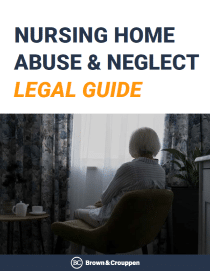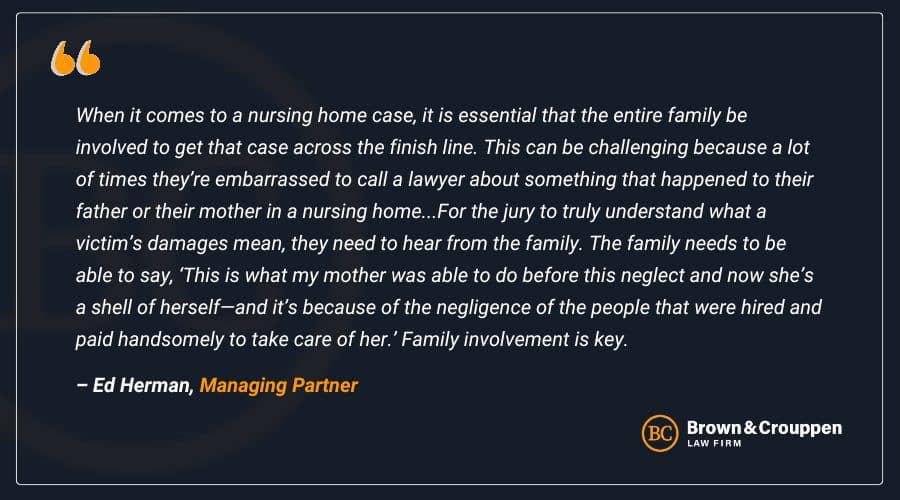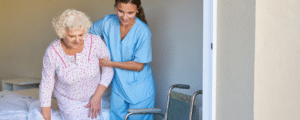
Use our guide to learn how to handle nursing home abuse and neglect, along with key legal considerations and insights.
1. Alert Authorities if You Suspect Imminent Threat
If you believe there is an imminent threat of physical harm call 911. This may include physical abuse such as altercations or abuse from staff.
2. Report Your Suspicions to Facility Administrators
If the abuse or neglect is an ongoing problem, report your suspicions to the facility’s administrators. In some cases, the abuse or neglect may be limited to specific staff members.
Speak to the nursing home staff and management regarding any issues that have come up and what your loved one has mentioned to you. When having any communication with the nursing home staff be sure to take notes, especially any names that come up. Be as thorough with your questions as you want to be. Take photographs to evidence your claims.
The nursing home should take immediate steps to remedy the situation.
3. File a Report with the Department of Health & Senior Services
Report the nursing home abuse to your state’s Department of Health and Senior Services (MDHSS) by calling or by reporting it online via their website. You can also file a report with the Licensing & Regulations department to initiate an investigation into your
loved one’s facility.
In the state of Missouri, you can call Missouri Department of Health and Senior Services (MDHSS) at 1-800-392-0210 to file a report if the abuse occurred in the state of Missouri. Alternatively you can file an online report using their online form at any time.
4. Document Occurrences of Abuse & Maintain a Record of Evidence
Document and store all evidence to maintain a record of occurrences. Any signs of physical abuse should be photographed. Additionally, your loved one should receive the appropriate treatment, along with a documented record of medical expenses.
Additional Considerations
Medical treatment
The first priority should be to get your loved one the medical treatment needed.
It is important to communicate to your doctor every complaint you have, even if you think it’s minor at the time. Some clients tend to dismiss minor aches/pains thinking they will go away and instead focus on more serious injuries. As it turns out, those minor issues may become more bothersome down the road. Having it documented in medical records early on will make it easier to connect to the facility’s abuse or negligence.
You should consider keeping a journal of all signs and symptoms. We constantly remind clients to document everything. This will serve as a helpful reminder and provide further evidence for who is liable to pay medical bills as the case moves forward. Also, your paralegal will most likely ask you to keep them updated on medical treatments, including which doctors were seen, any changes in the treatment plan, and how your loved one is feeling.
Talking to your loved one
If you are experiencing doubt about the care and treatment of your loved one, we advise you act immediately. The risk becomes imminent as more time lapses and we recommend doing the following:
Statute of limitations
Each state has a statute of limitations, which determine how long you have to file a nursing home abuse claim and take legal action. In the state of Missouri, the statute of limitations for nursing home abuse & neglect injuries is 5 years. This means you have 5 years starting from the of the injury (or date it was discovered) to pursue a claim and recover compensation for damages.
If your claim is the result of medical malpractice, there is a separate statute of limitations for medical malpractice claims with patients having 2 years from the date of injury to file a claim.
Additionally, states will have a separate statute of limitations for claims that involve wrongful death. For example, the statute of limitations for wrongful death in Missouri is 3 years starting from the date of the death.
Individuals who file after the deadline will be unlikely to file a successful claim.
Understanding signs of abuse & neglect
Nursing home abuse may occur in several different forms and does not always result in readily apparent injuries. Common types of nursing home abuse signs are as
follows below:
- Unusual level of confusion, disorientation, drowsiness or sleeping.
- Incontinence due to unavailable help with toileting or untimely.
- Heightened immobility or have difficulty getting around due to lack of assistance.
- Poor personal hygiene including smell of urine and feces, clothes that are soiled, non-bathed, overgrown nails, etc.
- Unexplained broken bones dislocations, bruising, scratches, etc.
- Dehydration and/or malnourishment with sudden weight loss, dry mouth, swollen tongue, reduced urine output
- Development of pressure ulcers also such as bedsores, open wounds, frequent urinary tract infections.
- Unexplained falls or incidents occur due to poor supervision and lack of assistance.
- Isolated and withdrawn behavior showing lack of interest in things that they normally would show interest in or get excited about.
- Agitation, anxiousness, fear, guilt, or embarrassment due to emotional abuse such as ignoring yelling for help/call lights, ridiculing, bullying, humiliating or threats of punishment.
Consult an attorney
Consult a nursing home abuse attorney in St. Louis or Kansas City nursing home abuse lawyer by requesting a free case evaluation.
A nursing home abuse attorney will help with investigations, collect supporting evidence, settlement negotiations, and prepare a case for trial if needed. Following an accident, navigating an abuse or negligence claim can be complicated – especially if your claim is disputed by the facility. In many cases, the facility will try to deny a claim or settle for significantly less than what is deserved. A nursing home abuse & neglect attorney can help you build a strong case and recover compensation for damages.

Frequently Asked Questions
What kind of compensation can be recovered?
Depending on the circumstances of the case, you may be eligible to recover compensation for the following types of damages: pain and suffering, current and future medical bills, lost wages, and damages associated with wrongful death.
How much compensation can be recovered?
The average nursing home neglect settlement amount is approximately $236,000. However, each case is unique, and compensation will vary depending on the unique circumstances and factors of your case. Payouts generally range from $150,000 to $350,000, but may be higher or lower based on many variables.
How long will the case take?
On average, the length of an elderly abuse case is about 2 years. Like settlement amounts, the overall length and timeline of a case will vary for each individual and may take more or less time depending on various case factors.








